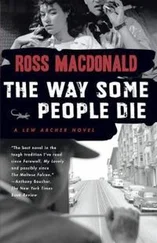That sounds like gibberish, doesn’t it, but believe me I mean every word of it, but I will try to write more calmly. I need your help, Mother. I know I can count on you, in spite of all the wasted years between us. You have known passion and suffered for it – but here I am going on again like a nineteenth-century romance. The point is, we need money and we need it right away if we are to get married. Burke is in some sort of trouble (nothing serious) and I should never have brought him back to this country. We plan to fly to South America – keep this under your hat! – if we can get the money, and you are the only one we can turn to. Mark is no help at all. He hates Burke, I even think he hates me, too. He says he’ll hire detectives to stop the wedding! Since he is one of the controllers of Aunt Ada’s trust, I can’t do anything in that direction until I’m twenty-five. So I am asking you to lend me five thousand dollars till January. If you will do this please have it ready for me and I will get in touch with you when we reach Mexico. We have enough money to reach Mexico.
Dear Mother, please do this. It’s the only thing I’ve ever asked of you. It’s the only thing I ask of life, that Burke and I have a chance to be happy together. If I can’t have him, I’ll die.
Your loving daughter,
Harriet.
I folded the letter along its creases and tucked it into the envelope. Mrs. Hatchen watched me as if it was a live thing which I might injure.
“It’s a strangely beautiful letter, isn’t it?”
“It didn’t strike me in quite that way. I’m not too crazy about some of the implications. Harriet wasn’t thinking too well when she wrote it.”
“What do you expect?” she said defensively. “The poor girl was under great strain. She’d just had a fearful battle with her father – Isobel told me something about it. Harriet was fighting for everything she holds dear.”
“So was Campion. Everything that he holds dear seems to be five thousand dollars.”
“Campion?”
“Campion is Burke Damis’s real name. He’s in jail in Redwood City at the moment. What about the five thousand dollars, Mrs. Hatchen? Would you have been willing to lend it to her?”
“Yes. I still am, if she is alive to use it. I brought it with me. Keith and I went into Guadalajara yesterday afternoon and took it out of the bank. It’s part of my settlement from Mark, and Keith had no real objection.”
“I hope you’re not carrying it around.”
“It’s in the safe at the hotel.”
“Leave it there. Harriet certainly won’t be needing it. I don’t believe it was her idea, anyway.” I turned to look at her under the light. “You’re a generous woman, Mrs. Hatchen. I took you for something different.”
“I am something different.” She narrowed her eyes and drew down the corners of her mouth. “Please turn off the light and don’t look at me. I’m an ugly old woman, trying to buy back the past. But I came back here about fifteen years too late. I had no right to leave Harriet. Her life would have turned out better if I’d stayed.”
“You can’t be sure of that.” I switched off the light, and noticed that all the lights in the Blackwell house had gone out. “Do you mind telling me just why you left Mark Blackwell? Did it have anything to do with Isobel?”
“No, he wasn’t interested in her. He wasn’t interested in any woman, and that includes me.” Her voice had become harsher and deeper. “Mark was a mother’s boy. I know that sounds like a peculiar statement to make about a professional military man. Unfortunately it’s true. His mother was the widow of the late Colonel, who was killed in the First War, and Mark was her only son, and she really lavished herself on him, if ‘lavish’ is the word. ‘Ravish’ may be closer.
“She spent the first years of our marriage with us, and I had to sit in the background and watch him dance to her tune, playing skip-rope with the silver cord. It’s a common story – I’ve heard it from other women, in and out of the service. You marry them because they’re idealistic and make no passes. The trouble is, they stay that way. Mark was like a little boy in bed. You’ll never know the contortions I had to go through to get a child. But we won’t go into that.
“When his mother died, I thought he’d turn to me. I was a dreamer. He transferred his fixation – yes, I’ve talked to the doctors – he transferred his fixation to poor little Harriet. It’s a terrible thing to see a person converting another person into a puppet, a kind of zombie. He supervised her reading, her games, her friends, even her thoughts. He made her keep a diary, which he read, and when he was away on duty she had to send it to him. He got her so confused that she didn’t know whether she was a girl or a boy, or if he was her father or her lover.
“He was worse than ever after the war, when he got back from Germany. The war was a disappointment to Mark; it didn’t do what he’d hoped for his career. Actually he only chose that career because it was a family tradition and his mother insisted on it. I think he would have been happier doing almost anything else. But by the time they retired him, he thought it was too late to start something new. And he had money, so he didn’t have to. There’s always been scads of money in the family, and he could afford to spend all his time on Harriet. He conceived the grand idea of turning her into a sort of boy-girl who would make everything come right in the end for him. He taught her to shoot and climb mountains and play polo. He even took to calling her Harry.
“It sickened me. I’m not the aggressive type, and I’d always been afraid of him – you get that way living with a man you don’t love. But I finally forced a showdown. I told him I would divorce him if he didn’t get some help, psychiatric help. Naturally he thought I was the one who was crazy – he couldn’t afford to think otherwise. Maybe I was, to stay with him for twelve years. He told me to go ahead and divorce him, that he and Harriet were enough for each other. She was only eleven years old at the time. I wanted to take her with me, but Mark said he would fight me to the limit. I couldn’t afford a court battle. Don’t ask why. Everything catches up with you in the end. So I lost my daughter, and now she’s really lost.”
We sat and let the darkness soak into our bones. I tried to relieve it.
“There’s a small chance that Harriet’s all right,” I said. “She and Campion may have decided to travel separately. It would account for his refusal to say what happened to her. She may turn up in Mexico after all.”
“But you don’t really think she will?”
“No. It’s just one of several possibilities. The others aren’t so pleasant to contemplate.”
There was a stir of life in the cab ahead. The driver got out and slouched toward us.
“You said a few minutes, ma’am. I don’t mind waiting if I know how long I got to wait. It’s this uncertainty that makes me nervous.”
“Things are rough all over,” I said.
“I was speaking to the lady.” But he went back to his cab.
Mrs. Hatchen opened the door on her side. “I’ve kept you longer than I meant to. You said you wanted to talk to Isobel.”
“Yes.”
“Do you think she knows something she hasn’t told?”
“People nearly always do,” I said. “It’s why I have a hard life, and an interesting one.”
She reached for the letter, which was still in my hand. “I’d like that back if you don’t mind. It’s very important to me.”
“I’m sorry. The police will have to see it. I’ll try to get it back to you eventually. Will you be staying at the Santa Monica Inn?”
“I don’t know. Isobel asked me to stay with her, but that’s impossible.”
Читать дальше












